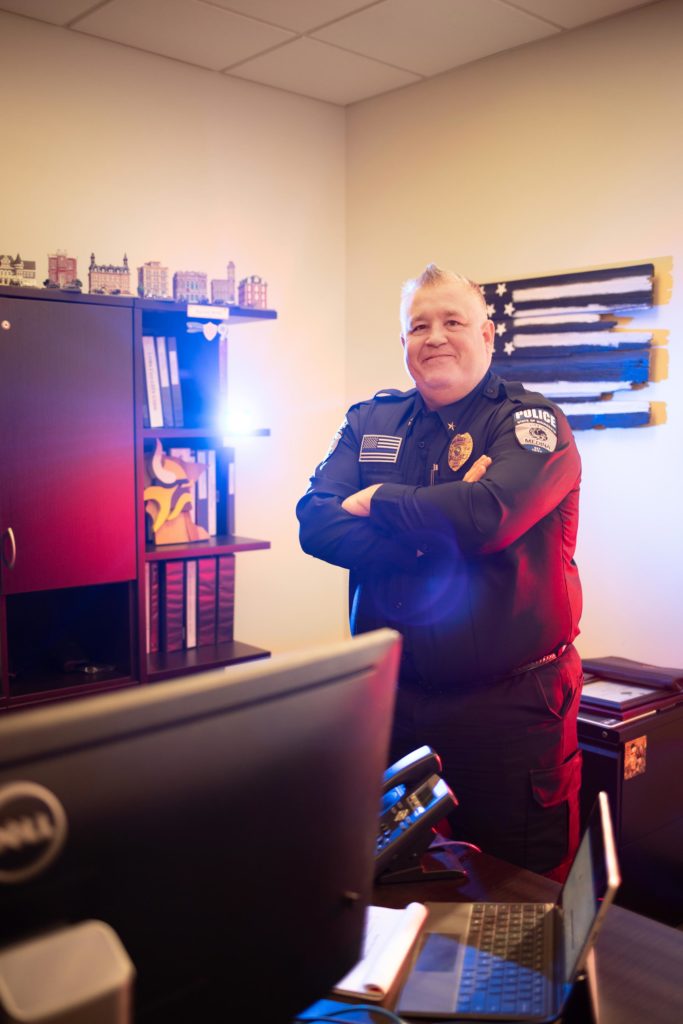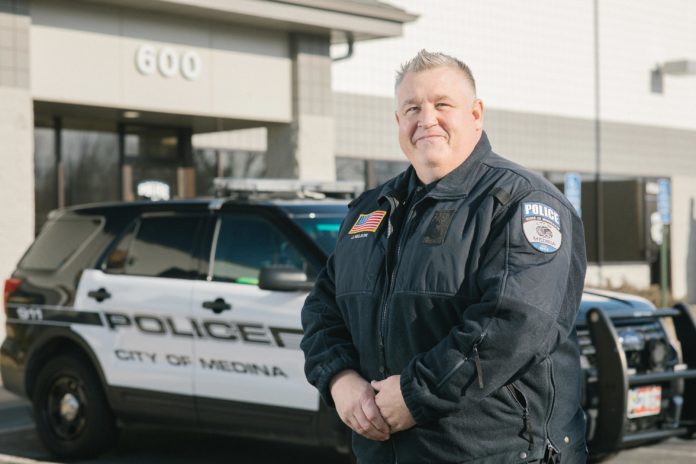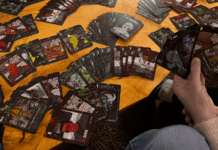Photos by Joel Morehouse
On April 1, 2020, Sergeant Jason Nelson became Chief Jason Nelson, replacing Ed Belland as the chief of police in Medina. For Chief Nelson to start on April Fool’s Day in 2020 seemed to be quite fitting. After all, only two weeks prior Governor Walz put in the order to shut down all “non-essential” businesses, and less than two months after Nelson filled the role, the civil unrest began in the aftermath of George Floyd’s death. An unrest that affected not just the city of Minneapolis but the state of Minnesota and continues across the nation and the globe as we speak.
We interviewed Jason on June 22, 2020 while he was in his first few months of this trial by fire. Jason was kind enough to sit down and talk about the last 20 years of experience including as the Medina’s first investigator, his time helping form a drug task force and as second in command for many years, which came to a head in the past eight months during one of the most uneasy years in modern history.
“When you’re the chief, you’re overseeing everything. But you rarely see the political side with the city council and the city administrator.” As sergeant and the second in command, Jason had been in charge of running the day-to-day operations and only recently began reporting to the city council.
Playing a Critical Role in Building the Department
“I was running patrol, investigations, fleet management, the community service officers and the reserves. There are ten officers in the Medina Police Department. I started in 2004 as a sergeant (second in command) when that role was formed, it was the first time anyone had been promoted in the department. We never had an investigator at that time, all investigations went to Hennepin County. So anytime a crime was committed, if the officers on the street couldn’t figure it out immediately, it got shipped to Hennepin County. When I got here in 2000 I was a sergeant and an investigator in a previous life from North Sioux City, South Dakota. When I came I just kept saying, ‘Why aren’t we doing our own investigations?’

He was told at the time that they didn’t have the time or the resources. He then began looking at the clearance rates and noted (of Medina), “we’re just a little city sending cases off to Hennepin County, and so are a lot of other cities. The county prioritizes cases, and says, ‘What can we solve? What can we not solve?’ And they don’t work on the ‘what can we not solve’ cases, they won’t come out here and check with neighbors to see if they have cameras. If it’s not documented in the report, they move on. There’s a criteria base, and to be honest, they’re not invested in this community. It’s understandable. You could clearly see the city and the citizens could use an investigator and we could use a supervisor. There was no one making the decisions out there. Up until then it had gone by seniority and the senior officer would tell you what to do. There was no accountability, as long as we did things and we didn’t screw up too bad and Ed wasn’t getting the phone calls on Monday morning.”
Narcotics and New Positions
It was decided at some point between 2000 and 2004 they needed to create the sergeant position and as part of it, Jason was also going to be the investigator and establish an investigations program. He had worked in narcotics investigations prior to actually being promoted to sergeant. The drug task force position was also newer at that time and as Nelson describes, “There was a lot of stuff within the schools and people were talking about it constantly. In 2004, it was different narcotics like marijuana, with ebbs and flows, where sometimes meth is very high, sometimes heroin is high.” It was safe to say that between the drug statistics and some residents, both were getting high. “Methamphetamine had been the cheapest, but today with the borders being closed due to covid, it becomes harder to get, which drives up prices.”
Nelson was part of the drug task force that was started up between Medina, Orono and West Hennepin just to see if it was viable. The council approved it. “During that time, in the short few months we were doing this, we had some major cases we ended up stumbling into. We confiscated hundreds of thousands of dollars in money and hundreds and hundreds of pounds of marijuana and methamphetamine. The cases became astronomical really fast. We were very successful. So it was decided this was something we were going to invest in full time.” During a large investigation, Jason got promoted to the sergeant slot and another was appointed to the drug task force to replace him.
“We’re preparing for the time when marijuana becomes legal, but we’re enforcing it now because it’s still on the books. The impaired part of it is harder because it dissipates from the time you can be at a certain level. From a court standpoint, it’s the quantitative part. What are the metabolics in your system? That can go up and down, it stays in your system for a long time, it can be up to 30 days. How do you determine what level makes you unsafe to be on the road? There are states that have imposed these laws and they’re farther along on how to proceed with court cases. It may be legal there, but it’s still illegal to drive impaired. There’s quite a high percentage of pull-overs, even right now, where you can smell marijuana, it’s very prevalent.”
Community Outreach and Police Reform
We asked Chief Nelson about how he feels the department relationship has been with people of color, especially with the heightened awareness in the aftermath of George Floyd’s death. “I think we treat everyone fairly, I don’t think there have been a lot of past injustices in this city. Those that live here, they’re privileged more so than those living downtown. I’m sure they’ve grown up and seen injustices, and possibly still deal with them. We don’t have a large population here, we think they’re happy with their police service and to be honest, most of the big home, affluent populations just want to be left alone. Even on National Night Out, some of those areas don’t even want to participate in that. We also have done Coffee with a Cop for community outreach, where we pick a spot, whether its Target, Starbucks, Caribou or facilities like Koch’s Corner, and we post (on social media) we’ll be there for an hour and people can come and have coffee with us, usually the Chief and some officers.”
He then went on to discuss what is going on within the police union. “So you have COVID, then the civil unrest with the (George Floyd) death; you have all that and then union negotiations. The patrol officers union contract is up in 2021 so we are now in negotiations. That is something I’ve never done, and before that the city council announced our budget is flat. There can be one more thing added on, you take over a position with visions of doing different things, like modeling and rebranding, just tweaking like the color of our shirts or a patch to help morale. It would be phased in, for example, it wouldn’t be a replacement of the entire fleet, it would be as replacements are needed. We would utilize the officers in the decision making. But it all costs, you can’t do it for free, you get the notice there’s worry of a recession, flat budgets, don’t increase anything. Yet we’re adding an officer, so that increases personnel costs, then squads and insurance.”
At the time of the interview, the department had two part-time CSO’s (community service officers), both students in law enforcement. “We created a policy several years ago, from the time a CSO passes their test, they stay with us an additional year, and if they don’t get a job within that year, their time with us is done. I’m looking at changing that up, keeping one of the school kids, and then getting a senior person or someone who is retired that just wants to work part-time. Then we won’t have to continually train every year or two, someone will be there hopefully five to ten years, long term, who can help train as these ones come and go.
When asked about Nelson’s thoughts on defunding the police, he answered it as he did all of our questions; Straight forward, pragmatically and with context. “Defunding may be reallocating. But if you reallocate the funding to social workers, we need more staff and more benefits, there has to be more money added. Even if you’re taking away some of that from police- unless you’re cutting cops and those positions completely- you’re hiring more people and officers will need to go to all the calls with those social workers to the calls. We wouldn’t want to put them in a dangerous situation. If I were a social worker and sent to a domestic violence call, there has to be someone there in case it escalates. There are certain things that can be done, but it’s not a quick fix. It’s going to take time to train and test.”
A Direct Approach During a Year of Change
“I try to be open and transparent, to a fault where I’m a little black and white; open and honest. I’m that way with the staff too, and that’s what they all say they like about me. There is no misunderstanding of which direction we’re going, and what we need to do. If we don’t do it, then we’re going to talk. But then I don’t hold a grudge either. We can definitely have hard conversations; we can agree to disagree and then let’s move on. I’ll take you out to lunch afterwards, but I don’t want to see repetitive things.”
Given that the interview with Chief Nelson was done in June of 2020, I followed up with some questions in November regarding the new Covid mandates, officer training in the aftermath of George Floyd’s death and what has been his most enjoyable part of being the new chief over the past eight months.
Covid Mandates
“As you know, by putting a mask on someone it makes it more difficult to be personable. The general public has a hard time seeing the smile on the officer’s face. From the start I have said we are not the mask police or restriction police. Our main goal is to educate the general public and not so much enforce the mandate. I also worry about officer safety because I do not want the general public not being able to clearly hear what an officer is saying or when giving commands. In addition to voice inflection, facial expressions are needed as well to get compliance in a tense situation.”
“As for the restrictions on gatherings, we will take the complaints as information and then pass them onto the Minnesota Department of Health or the Attorney General’s Office for follow up. As for enforcing holiday gatherings, we will again educate and leave the decisions to those that are hosting the gatherings to do what they feel is right in their own residences.”
Regarding Policies to Department in Aftermath of George Floyd Death
“I have looked at all our policies. In fact, in mid-November, we updated our entire policy manual to include adding De-Escalation and Duty to Intervene policies. In addition to that made it mandatory that officers take additional online training on these policies. Our entire Use of Force policy has been revamped to mirror the changes as required by the state legislators after the last session. We continually look for ways to improve and, as always, being transparent at the same time.”
The New Chief’s Most Enjoyable Part of the Job
“Probably one of the most enjoyable parts has been having the opportunity to promote a sergeant and add an additional officer to the department. The police department had not hired an additional officer since 2007. I had the pleasure of hiring a local woman who had been a community service officer for the department. It was a special day when I was able to offer the job to Kaylen Boeddecker. Listening to the excitement in her voice when I offered her the job was very rewarding.”
“Other aspects of the job that I really enjoy is working for a community such as Medina that supports its local law enforcement. This starts with the community and goes all the way to our civic leaders. I get phone calls, emails, and faxes every week saying how much they support the police or thanking officers for a job well done. We have an excellent police force, and we all enjoy going to work every day for the citizens of Medina.”







